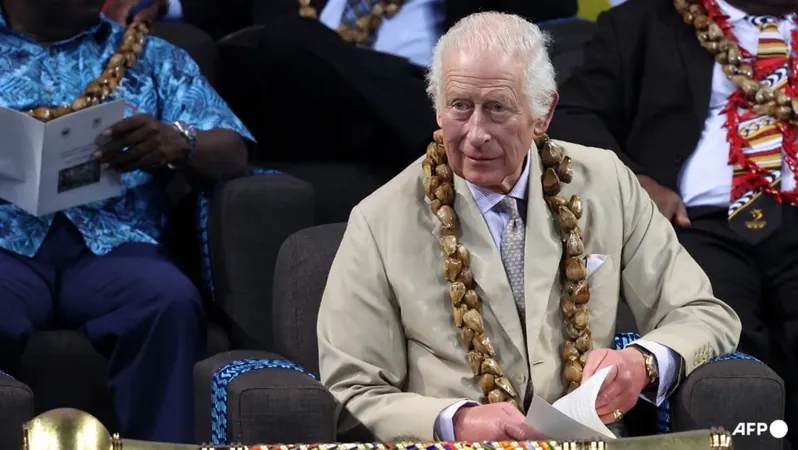
King Charles Addresses Commonwealth's Dark History of Slavery Amidst Calls for Reparations
2024-10-25
Author: Arjun
King Charles Addresses Commonwealth's Dark History of Slavery
APIA, Samoa: In a poignant speech during the Commonwealth Heads of Government Meeting on October 25, King Charles III emphasized the need for the Commonwealth to confront its 'painful' history, particularly in relation to slavery. This comes at a time when many African and Caribbean nations are intensifying their demands for reparations from Britain for its historical involvement in the transatlantic slave trade.
The summit, which convened representatives from 56 member countries with roots in Britain’s former empire, has slavery and the looming threat of climate change as central topics of discussion. King Charles remarked, 'I understand from listening to people across the Commonwealth how the most painful aspects of our past continue to resonate. It is vital, therefore, that we understand our history to guide us towards making the right choices in future.'
The demand for reparations is not a new phenomenon, but recent global movements have gained considerable traction, especially among the Caribbean Community (CARICOM) and the African Union, as countries seek to address the historical injustices of slavery. While proponents argue that reparations are essential to rectify enduring racial inequalities, opponents contend that contemporary nations should not bear the burden of historical transgressions.
British Prime Minister Keir Starmer has dismissed direct reparations but expressed willingness to engage in discussions regarding the issue. A source within his office indicated he might consider 'non-financial reparations,' which could include reforms in financial institutions and measures like debt relief.
Reparations can take various forms, including financial payments, formal apologies, technology transfers, and educational initiatives. CARICOM has developed a specific reparations plan aimed at addressing the historical wrongs of slavery.
Bahamas Foreign Minister Frederick Mitchell announced that the summit's draft conclusions would include discussions on reparations, asserting, 'If we say we want greater equality and equity in the world, the way to do this is to examine what and how reparations might manifest.'
The consequences of the transatlantic slave trade are stark. Between the 15th and 19th centuries, approximately 12.5 million Africans were forcibly taken from their homes and sold into slavery, enduring brutal conditions on plantations under the ruthless exploitation of their labor.
Commonwealth Secretary-General Patricia Scotland highlighted the remarkable achievement of the Commonwealth in maintaining unity despite its traumatic shared history. She noted that the group has managed to 'confound the painful history which brought us together and sit together as equals for 75 years.'
Alongside discussions on reparations, there is a crucial focus on climate action. Member states are slated to sign the Commonwealth Ocean Declaration, which aims to secure funding for ocean health and establish marine boundaries that endure even if some low-lying nations become uninhabitable due to rising sea levels.
Scotland reinforced the importance of this declaration, stating, 'What the Ocean Declaration seeks to do and to say is that once your marine boundaries are fixed, they’re fixed in perpetuity.' With many Commonwealth countries being small island nations vulnerable to climate change, this initiative is essential for safeguarding their future.
As discussions unfold, the Commonwealth stands at a crossroads, facing the challenge of reconciling its historical legacies with the need for sustainable progress and equality. The summit serves as a vital platform for addressing these pressing issues amid a global landscape demanding accountability and action.




 Brasil (PT)
Brasil (PT)
 Canada (EN)
Canada (EN)
 Chile (ES)
Chile (ES)
 España (ES)
España (ES)
 France (FR)
France (FR)
 Hong Kong (EN)
Hong Kong (EN)
 Italia (IT)
Italia (IT)
 日本 (JA)
日本 (JA)
 Magyarország (HU)
Magyarország (HU)
 Norge (NO)
Norge (NO)
 Polska (PL)
Polska (PL)
 Schweiz (DE)
Schweiz (DE)
 Singapore (EN)
Singapore (EN)
 Sverige (SV)
Sverige (SV)
 Suomi (FI)
Suomi (FI)
 Türkiye (TR)
Türkiye (TR)